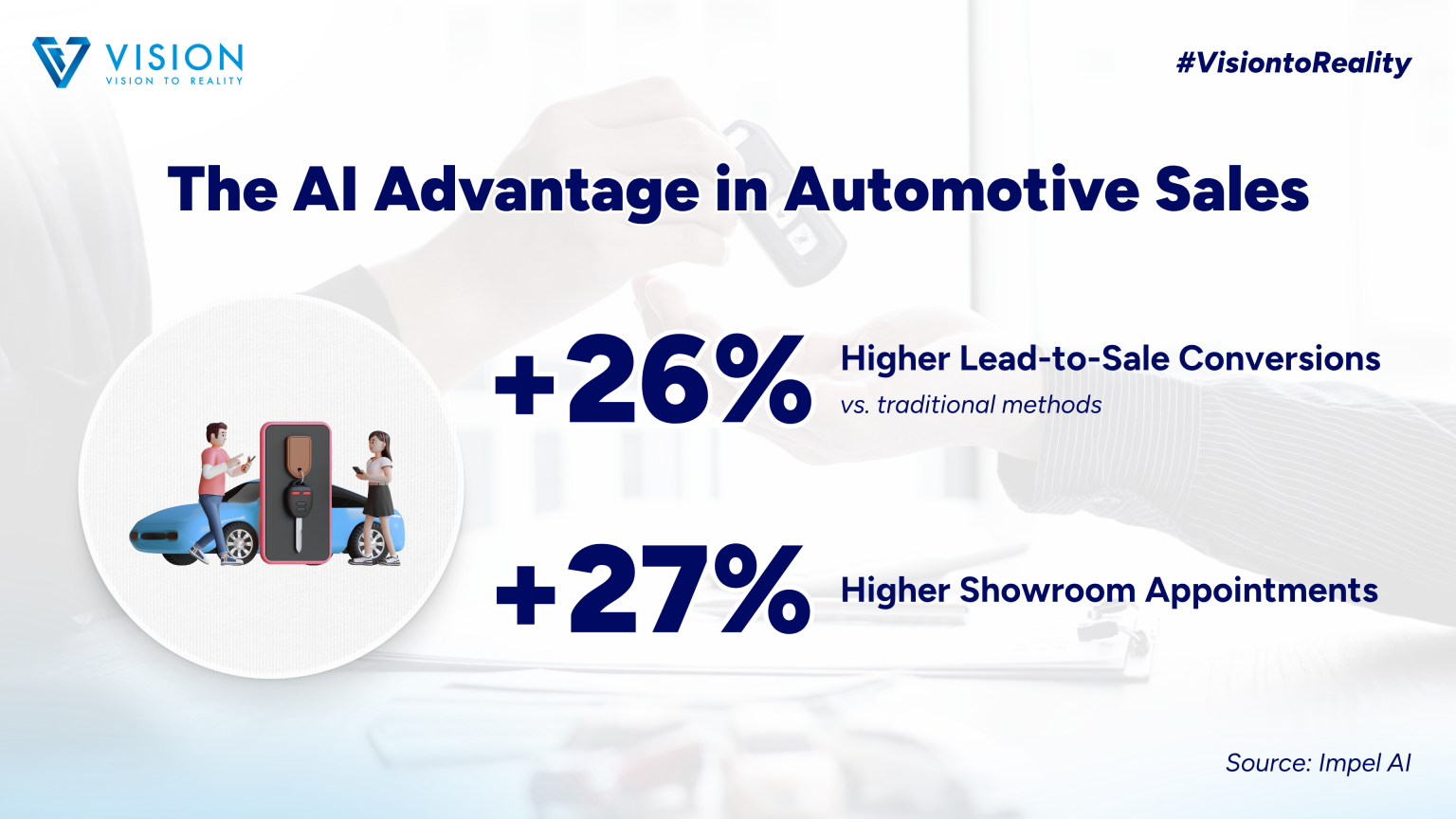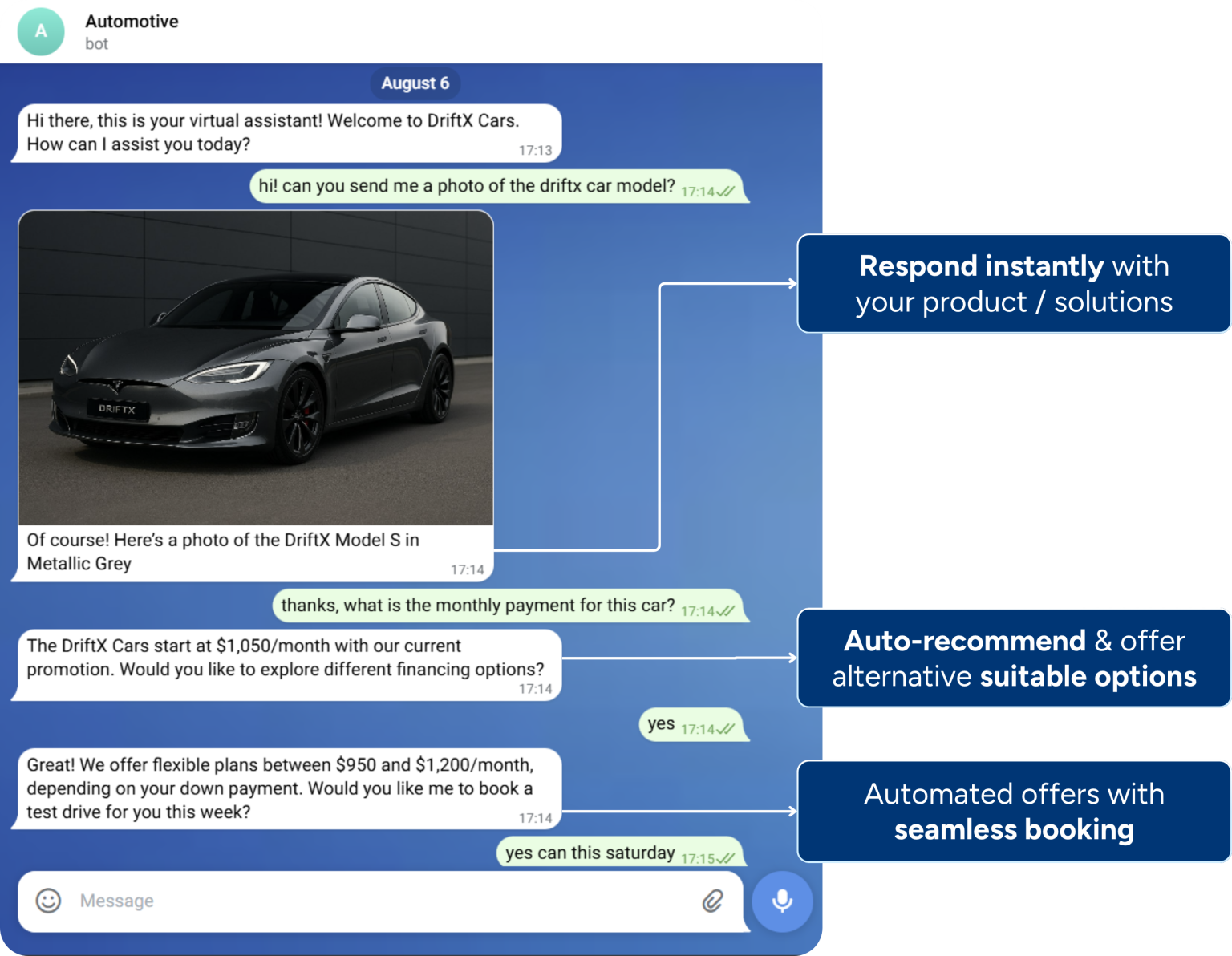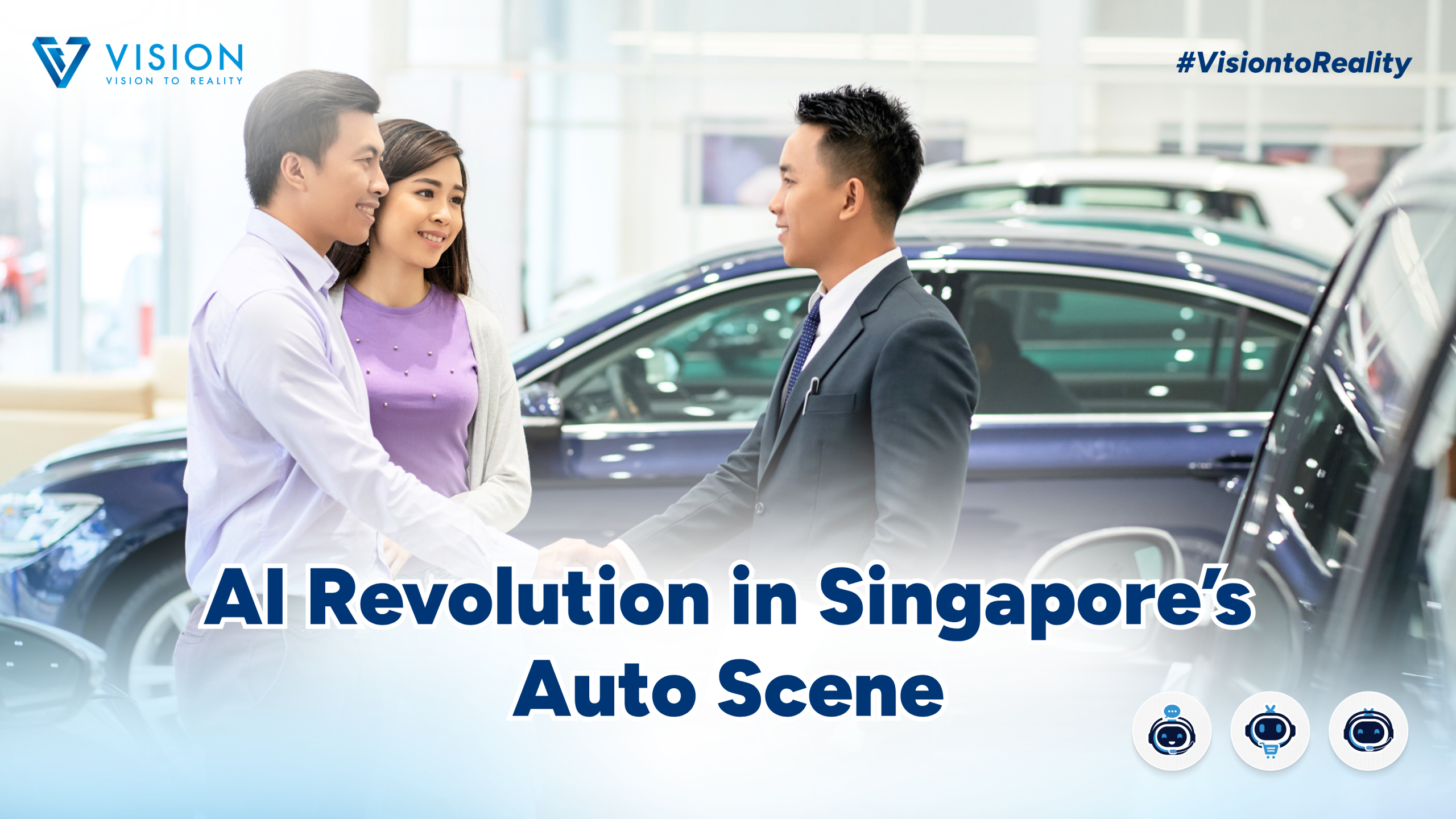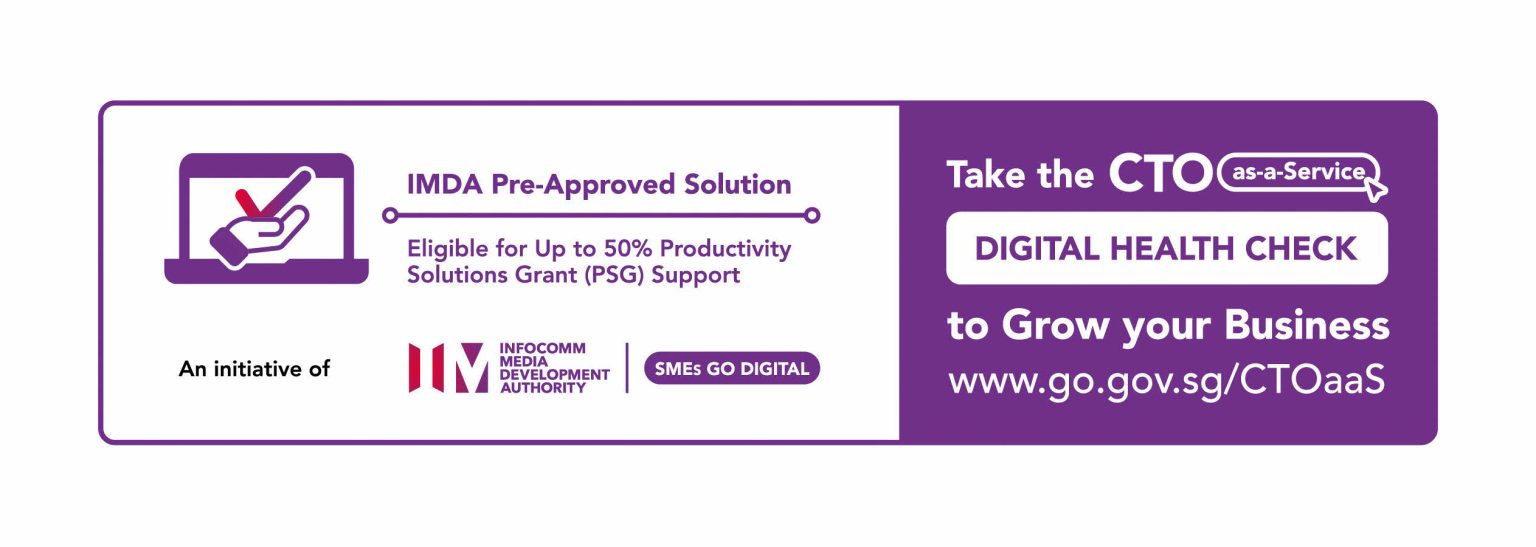In today’s fast-paced automotive market, standing out from the competition is no longer just about offering the best deals — it’s about offering the best experience. As customer expectations evolve, dealerships must find ways to engage with customers more efficiently, consistently, and at scale. This is where Generative AI comes into play.
Generative AI isn’t just a buzzword; it’s transforming how automotive businesses in Singapore are interacting with customers, optimizing operations, and boosting sales. From automating lead management to creating personalized customer experiences, Generative AI is becoming a game-changer for growth in the automotive industry.
In this post, we’ll explore how leading automotive brands like Toyota are already leveraging Generative AI to enhance their sales and customer service processes. We’ll dive into the profound impact Generative AI is having on dealership operations — from improving sales conversions to enhancing customer retention. Most importantly, we’ll show how Generative AI-driven engagement is enabling businesses to stay competitive, offering services that meet the modern consumer’s 24/7 expectations.
Ready to see how Generative AI is transforming automotive sales and service in Singapore? Let’s explore the key ways Generative AI is driving success for dealerships here.
AI in Action: How One Automotive Brand Boosts Sales & Engagement
Before we dive deeper into how your dealership can scale using AI, let’s take a look at how one of the biggest automotive brands, Toyota, is already making strides with AI.
Toyota’s use of Generative AI to improve various aspects of its business has already started showing remarkable results, from enhancing customer engagement to increasing operational efficiency.
Source: Toyota Newsroom
The Impact of Big Automotive Brand’s AI Investments
Toyota’s broader AI initiatives have also yielded substantial financial returns. The company has reported an over 20% return on investment (ROI) in several AI applications. The company’s AI-driven predictive maintenance in its factories has reduced downtime by 25% and improved productivity by 15%.
In 2020, Toyota’s AI investments helped drive a 10% increase in revenue and a 5% rise in profitability. Furthermore, Toyota’s AI-powered customer service chatbots have led to a 20% reduction in customer complaints and a 15% increase in customer satisfaction. These results highlight the immense value that AI can bring, not only in improving customer engagement but also in streamlining operations and driving substantial business growth.
These results highlight the immense value that AI can bring, not only in improving customer engagement but also in streamlining operations and driving substantial business growth.
Source: Kuey
How AI is Impacting Dealership Sales and Service

A recent study by Impel AI, analyzing data from 230 dealerships and approximately 360,000 leads, highlights the significant advantages of AI-powered solutions in automotive sales. Dealerships using AI-enabled lead management have seen remarkable improvements:
💠26% higher lead-to-sale conversion rates compared to traditional methods.
💠27% higher showroom appointment set rates.
These findings suggest that dealerships not leveraging AI could be missing out on a potential 26% increase in conversions, assuming other factors remain constant.
The impact of AI adoption extends beyond sales conversion. Dealerships using AI-driven communications have reported:
💠Higher service appointment completion rates: Customers who engage with AI-driven messages were 27% more likely to complete their service appointments within 90 days. This behavior translated into an additional 95 repair orders per dealership per month.
💠Increased service revenue: By integrating service schedulers into AI-powered outreach, dealerships experienced a 22% boost in service revenue per month, which amounts to an average of $15,000 in incremental revenue each month.
Through continuous data analysis, AI can identify service needs, conduct proactive customer outreach, and make scheduling effortless. This integration of AI throughout the customer journey leads to more efficient processes, revenue growth, and long-term profitability for dealerships.
However, while AI offers remarkable benefits, its full potential can only be unlocked when businesses address the key challenges they face in their sales and service processes. Let’s explore these challenges and see how they can be tackled effectively.
1️⃣The Hidden Cost of Missed Conversations

In the fast-paced world of automotive sales, every unanswered message is more than just a missed opportunity – it’s a missed sale. When a customer reaches out to inquire about a car’s availability, pricing, or to schedule a test drive, they often contact multiple dealers at once. If your response isn’t the first or isn’t fast enough, you’re already losing ground.
Time is a critical factor here. Customers want quick answers and don’t want to wait for a response. If you’re slow to reply, not only are you losing the lead, but you’re also eroding trust. In a competitive market like automotive sales in Singapore, customers remember the dealers who respond quickly, clearly, and consistently. When your team misses even a few inquiries, you could be losing more than just a sale – you could be losing a loyal customer.
Moreover, every missed conversation represents more than just lost sales – it impacts your reputation. If customers feel their inquiries aren’t valued, they’ll turn to competitors. In today’s digital-first world, expectations are higher than ever before. Customers expect 24/7 access to information and immediate responses, and any delay could signal to them that their business isn’t a priority. This gap between customer expectation and your response time can ultimately cost you, not just in immediate sales but also in long-term loyalty.
While timing is everything, having a great first response is only part of the story, and without automation, the chance to convert leads can quickly slip away.
2️⃣More Leads Don’t Always Mean More Sales

Automotive businesses, especially small to medium-sized enterprises (SMEs) in Singapore, are excellent at driving interest. Whether it’s through ads, social media campaigns, or other marketing channels, they know how to attract customers. However, attracting attention is just the beginning. The real challenge lies in converting that interest into meaningful conversations and, ultimately, sales.
Without structured follow-ups, leads fade away quickly. Many dealers find themselves in a constant cycle of attracting new prospects, but the lack of timely or consistent follow-up leads to high dropout rates. It’s not that businesses aren’t generating enough leads; the problem is that those leads aren’t being nurtured effectively.
Sales cycles can be lengthy and complex, and losing track of prospects can happen even with the best intentions. The challenge is not attracting interest but converting that interest into committed buyers. Consistency is the key. It’s what turns a fleeting curiosity into a solid commitment. And the best way to achieve this at scale? Automation.
Automated systems ensure that no lead goes unnoticed, and that follow-up communications happen at the right time. Through timely, consistent touchpoints, you can keep customers engaged without relying on the human element, which can sometimes falter under the pressure of multiple tasks. AI-driven systems can capture lead data, segment leads based on their behaviors, and nurture them throughout the buying journey, making sure that no opportunity is left behind.
Manual follow-ups often leave businesses struggling to keep up, especially when scaling becomes a priority.
3️⃣Why Manual Follow-Ups Fail

Sales teams in automotive businesses often juggle multiple conversations across different channels – phone calls, emails, in-person visits, and chat inquiries. While they’re doing their best, it’s easy for reminders, quotes, or follow-ups for test drives to slip through the cracks. When the outreach depends solely on human effort, even the most promising leads can get lost in the shuffle.
The truth is, manual follow-ups are time-consuming and prone to human error. The more hands-on your process is, the harder it is to keep track of every customer’s journey. As a result, valuable opportunities are left untapped. This inefficiency becomes more noticeable as businesses grow, and the volume of inquiries, leads, and follow-ups increases. Sales staff can quickly become overwhelmed by the sheer number of tasks that need to be managed, causing some of the most important follow-ups to fall through the cracks.
Moreover, human efforts alone cannot guarantee the kind of consistency required to close deals at scale. Salespeople, no matter how dedicated, are limited by time, capacity, and bandwidth. They cannot always respond immediately or follow up in a timely manner. This inconsistency can result in missed opportunities, and for every lead that doesn’t get the attention it needs, your competitors are right behind, ready to take advantage.
This is where automation comes into play, helping businesses handle the repetitive tasks and giving sales teams the power to focus on high-value activities that require a personal touch.
4️⃣Selling Beyond Office Hours

Customers don’t keep office hours – they browse late at night, compare prices after hours, and sometimes make decisions first thing in the morning. But most automotive businesses in Singapore close shop when the workday ends. Imagine if your business stayed active around the clock, responding to questions, sharing promotions, scheduling appointments, and confirming payments – all while your team rests.
This doesn’t mean replacing your people with machines; it means amplifying their capabilities. Intelligent chatbots and automation tools can keep the conversation going beyond office hours, ensuring that no inquiry goes unanswered. With AI-driven engagement, your customers always feel attended to, even when your team isn’t available.
One of the biggest barriers in the automotive industry is the traditional 9-5 model, where sales and support teams are unavailable after hours. In reality, customers might be shopping or seeking assistance at any time, whether they are on a lunch break, after dinner, or during the weekend. By enabling AI to handle these after-hours inquiries, dealerships can offer the level of service and accessibility that modern consumers expect, ensuring that no lead is missed.
AI doesn’t replace the personal touch of a human salesperson but complements it. By handling routine questions and setting appointments, AI empowers your team to focus on more strategic, high-touch interactions that drive conversions.
5️⃣The Future of Automotive Engagement: Consistent, Scalable, Always-On

The future of automotive sales in Singapore isn’t about more staff or longer hours. It’s about smarter, more efficient engagement. Businesses that reply faster, follow up consistently, and operate beyond office hours are already ahead of the game.
AI-powered engagement is transforming the way automotive businesses approach customer service and sales. It’s no longer just about having the right technology; it’s about integrating that technology into every part of the sales process, from initial inquiry to post-sale follow-up. AI allows businesses to maintain constant communication with customers, ensuring timely and personalized interactions throughout the buying journey.
By turning lost opportunities into loyal customers and ensuring no enquiry is ever left behind, businesses can drive more sales, improve customer satisfaction, and scale operations without the need for a larger workforce. The key to success is consistency – AI ensures that every lead is nurtured, every customer is engaged, and every potential sale is maximized.
This transformation isn’t just theoretical; it’s happening now. The businesses that embrace intelligent, always-on engagement will be the ones that lead the market. The future of automotive sales lies in creating seamless, automated experiences that not only meet but exceed customer expectations.
Ready to Transform Your Automotive Sales & Service?
As the automotive industry continues to evolve, leveraging AI-powered engagement is no longer a luxury – it’s a necessity. The businesses that embrace automation, AI-driven insights, and 24/7 customer engagement are setting themselves apart from the competition. By optimizing lead management, improving follow-up consistency, and offering after-hours support, dealerships can turn missed opportunities into long-term customers.
See how leading automotive businesses in Singapore are scaling their sales and service operations through intelligent engagement solutions. These advancements not only streamline operations but also drive sales growth, enhance customer satisfaction, and improve overall efficiency. Best of all, with up to 50% PSG funding under the IMDA’s SMEs Go Digital programme, it’s easier than ever to get started.



